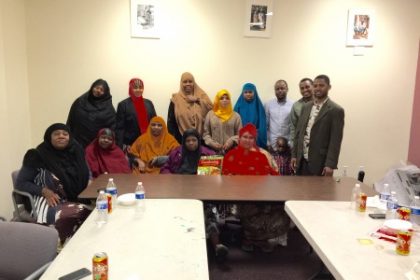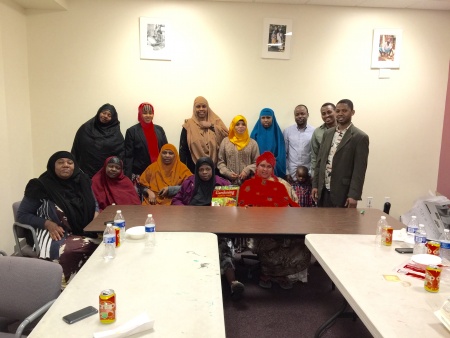
 Imagine, if you will, that you come from a hot, dry place. And now you are “resettled” in a place that is green, cold, and wet. You speak a language, in fact a number of dialects, so unlike English that English sounds like no language at all. You are a member of the Somali Bantu community in Lewiston, Maine, a small city of some 36,000 people where about 22 percent are at or below the poverty level.
Imagine, if you will, that you come from a hot, dry place. And now you are “resettled” in a place that is green, cold, and wet. You speak a language, in fact a number of dialects, so unlike English that English sounds like no language at all. You are a member of the Somali Bantu community in Lewiston, Maine, a small city of some 36,000 people where about 22 percent are at or below the poverty level.
It’s possible you might have trouble getting by.
The Sustainable Livelihood Relief Organization (SLRO) was formed by members of the Somali Bantu community “to help immigrants, especially refugees and asylum-seekers, improve their participation rates in the American labor market and help immigrants build long-term wealth through the establishment of sustainable livelihoods,” according to the group’s president, Jama Mohamed.
The most immediate problem the group faces is food insecurity. To combat this, in the near term, they received this year a Seed grant from the Grassroots Fund to help them establish a food bank to reduce hunger “with foodstuffs that are better known to and understood by our people.” Over the longer term, the group has three goals, Mr. Mohamed points out: 1. To support local men and women in finding suitable employment, earning college and graduate degrees, and advancing into “sustainable livelihoods.” 2. To provide relief to those who cannot provide for themselves and to assist families to become more resilient by giving them the means to earn an income. 3. To link our community members with the resources, the education, the training, and the friendship of and partnership with other NGOs, governmental agencies, and educational institutions in order to integrate into the local Maine economy more efficiently.
The main activity of the group focuses on farming. While the long term goal of farming initiatives on land of their own will take time, the group is working to help Somali Bantu people become successful farmers in Maine by coordinating “experiential learning” opportunities on local farms during the planting, harvesting, processing, and marketing and sales cycles. “We need to respond to our marginalization in the Maine food economy by building up the knowledge and the capacity to farm, harvest, market, sell and distribute our produce,” Mohamed says. “We need to allow women to grow to feed their families and we need others to take it a step farther by selling produce in the farmer’s market and to local food stores” he explains, adding, “We need to teach them how to pickle, freeze, dry, and add value to produce.”
To do this, the group is engaged in a project called “From Apartment to Lot to Greenhouse to Field to Farm” with six farms in Maine to trade work for knowledge and training “in how to be a Maine farmer. “Our strategy is based on honest and straightforward outreach to our community, as SLRO organizes programs and workshops to reach the people where they are—in the mosques, in their homes, at celebrations, at community meetings,” Mohamed says. The outreach is intended to teach people the steps they need to take to provide for themselves by farming, by working on farms, by learning new trades, and by providing nutritious food from a Food Bank. “We want every family to be successful; we cannot afford anyone not to succeed here in America,” Mohamed explains. “Our Bantu community is largely uneducated and generally unskilled, and we are seeking to achieve a ‘pipeline’ of educated people who can help others learn how to buy healthy food and eat nutritiously. We have found the farm owners in Maine are wonderful to work with and we are proud of SLRO because it has an excellent reputation,” he notes. “The hard part is teaching the people how to think differently, how to reduce their reliance on Food Stamps (EBT cards), and how to feel secure in their ability to feed their families. These are our intended results.”
Related Groups
This post was originally published as a Featured Story on the New England Grassroots Environment Fund’s website.




